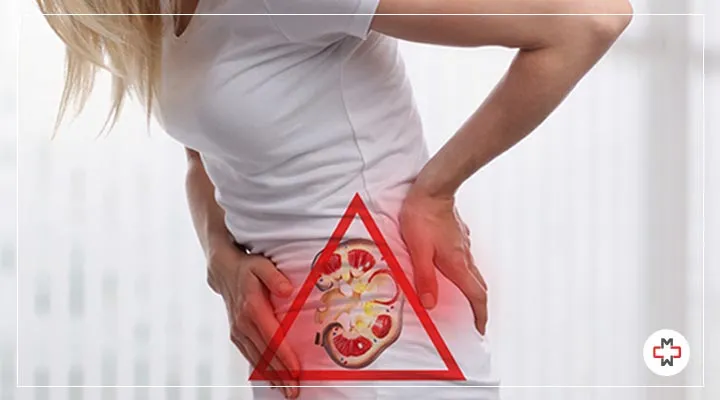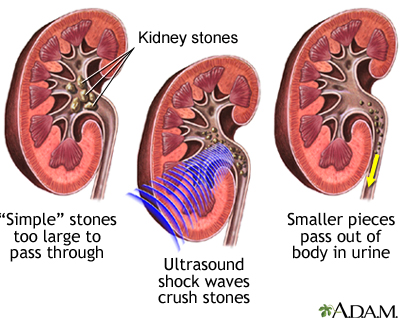Discovering the Manifestations and Causes of Kidney Stones in Contrast to Urinary System Tract Infections: An In-depth Overview
The exploration of kidney rocks and urinary system tract infections (UTIs) exposes an intricate interaction of symptoms and underlying causes that necessitate careful evaluation. While both problems can lead to hematuria, they present unique professional features and occur from various etiological variables. Understanding the nuances of each condition is vital for reliable diagnosis and management. What are the essential distinctions in their signs and symptoms, and just how might these inform treatment strategies? The responses to these concerns might supply essential understandings right into the avoidance and treatment of these usual urological issues.
Overview of Kidney Stones
Kidney rocks, additionally recognized as kidney calculi, type when specific compounds in the urine crystallize and aggregate, bring about the growth of tough down payments within the kidneys. These stones can vary in dimension, varying from a grain of sand to a golf sphere, and can be composed of various materials, one of the most usual being calcium oxalate, uric acid, struvite, and cystine. The formation of kidney stones is affected by numerous aspects, including dietary behaviors, liquid intake, and genetic proneness.
Signs and symptoms of kidney stones may consist of severe discomfort in the back or side, blood in the pee, queasiness, and frequent peeing, especially as the stone relocates with the urinary system. Diagnosis generally entails imaging research studies such as ultrasound or CT scans, alongside urinalysis to recognize the rock's composition.
Therapy choices vary based upon the size and kind of stone, along with the intensity of symptoms (Kidney Stones vs UTI). Tiny stones might pass naturally with raised fluid consumption, while larger rocks may call for medical treatments such as lithotripsy or surgical elimination. Comprehending the pathophysiology and threat aspects related to kidney rocks is essential for reliable prevention and administration
Overview of Urinary System System Infections
Urinary system infections (UTIs) are usual microbial infections that affect any type of part of the urinary system, consisting of the kidneys, ureters, bladder, and urethra. They mostly occur when bacteria, typically from the stomach system, enter the urinary system, leading to inflammation and infection.
The occurrence of UTIs is significantly greater in females than males, primarily due to anatomical differences, such as a shorter urethra. Danger aspects consist of sex-related task, specific contraceptive techniques, urinary system retention, and dehydration. The medical diagnosis of UTIs is usually validated via urine tests, which may reveal the presence of bacteria, white blood cells, or red blood cells.

Signs of Kidney Stones
The discomfort linked with kidney rocks can manifest in various means, commonly leading individuals to seek clinical interest. One of one of the most typical symptoms is extreme discomfort, usually localized in the reduced back or side, which may emit to the abdominal area or groin. This pain, usually called sharp or cramping, can occur suddenly and might vary in strength.
Furthermore, individuals might experience hematuria, or blood in the urine, which can vary from microscopic quantities to visible staining. This sign might be gone along with by changes in urinary system habits, such as raised frequency or necessity, in addition to pain during peeing. Nausea and throwing up are also widespread, frequently arising from the body's reaction to extreme discomfort.
In some cases, individuals might experience high temperature and cools, particularly if a second infection develops due to the obstruction triggered by the rocks. In general, the mix of extreme discomfort, hematuria, altered urinary patterns, and intestinal signs and symptoms can provide considerable insight right into the visibility of kidney rocks, warranting prompt medical examination and treatment. Recognizing these symptoms is essential for timely medical diagnosis and efficient monitoring of the problem.
Signs And Symptoms of Urinary System System Infections
Infections within the urinary system system often present a range of distinctive signs that can substantially affect day-to-day live. One of the most this article usual signs and symptoms consist of a persistent urge to pee, often accompanied by a burning sensation throughout peeing, recognized as dysuria. People may likewise experience enhanced frequency of urination, generating percentages of pee each time.
Other noteworthy symptoms consist of Get the facts over cast or fetid urine, which might show the existence of germs or pus. Sometimes, pee might appear red or pink due to the visibility of blood, a problem called hematuria. Additionally, people might experience pelvic discomfort or stress, which can additionally worsen the feeling of necessity.
Systemic signs may additionally materialize, such as fever, cools, and tiredness, particularly if the infection has actually risen to the kidneys. It is necessary to recognize these signs and symptoms early, as without treatment urinary system infections can bring about much more extreme issues. Kidney Stones vs UTI. Prompt clinical interest is advised when these signs and symptoms are observed, permitting ideal analysis assessment and therapy to ease discomfort and protect against additional health problems
Reasons For Each Condition
Regularly, kidney stones and urinary system tract infections emerge from unique yet sometimes overlapping causes that can influence individuals in different ways. Kidney stones commonly form as a result of metabolic factors, nutritional options, and genetic predispositions. Raised levels of calcium, oxalate, or uric acid in the urine can bring about rock formation. Dehydration, inadequate fluid consumption, and high-sodium diet regimens can intensify these problems, advertising condensation within the urinary system system.

Comprehending these distinct causes is critical for avoidance and treatment. Kidney Stones vs UTI. While lifestyle modifications might alleviate the risk of kidney rocks, ideal hygiene and prompt therapy of urinary system tract infections are essential for lowering their reoccurrence and associated difficulties
Verdict
In summary, kidney rocks and urinary system tract infections existing distinctive symptoms and underlying reasons. Kidney rocks are characterized by extreme discomfort and metabolic elements, while urinary system system infections mainly include microbial infections leading to urinary seriousness and pain.
The expedition of kidney stones and urinary system infections (UTIs) discloses a complex interplay of signs and underlying reasons that warrant cautious exam.Urinary system tract infections (UTIs) are typical microbial infections that influence any part of the urinary system, including the kidneys, ureters, bladder, and urethra.Often, kidney rocks and urinary system system infections arise from unique yet often overlapping reasons that can influence individuals differently.In summary, kidney stones and urinary system system infections existing distinctive signs and symptoms and underlying reasons. Kidney rocks are characterized by severe pain and metabolic elements, while urinary tract infections mainly include microbial infections leading to Find Out More urinary system necessity and pain.
Comments on “Kidney Stones vs UTI: Necessary Details on Therapy Alternatives and Avoidance”